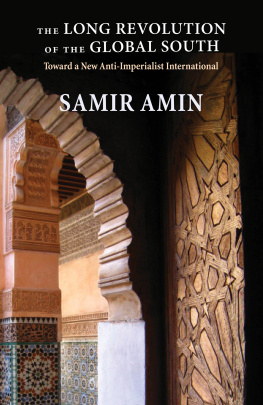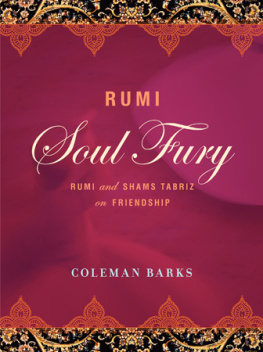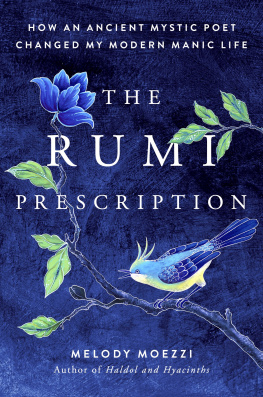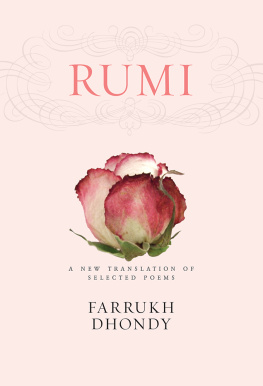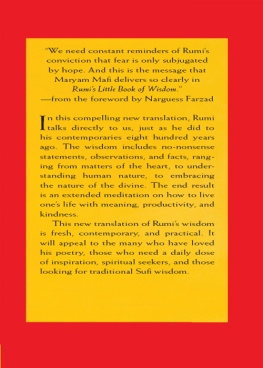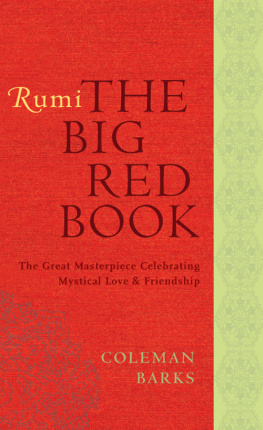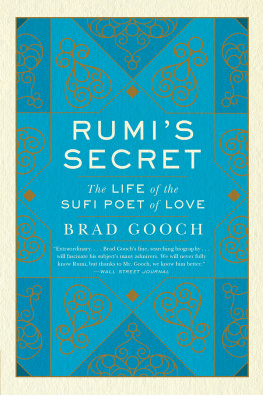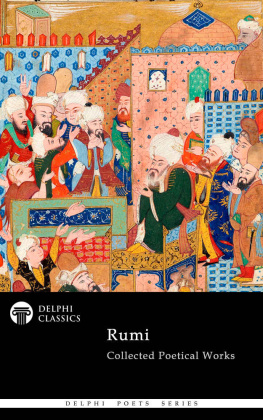Praise for RUMI
Rumis rubaiyat were almost certainly thrown off extempore and recorded by his disciples; in these clear, accurate, vivid, and often very beautiful versions we come as close as is possible in English to catching the evanescent moment of composition, the thought as it flickers from Rumis mind out into the world.
Richard Davis, Professor Emeritus, Ohio State University; translator of The Conference of the Birds, Shahnameh, and Vis and Ramin
What could be more exciting than to have the vast erudition of Amin Banani and the spiritual sensibility of Anthony A. Lee applied to bringing Rumis poetry into English? A tour de force that no one interested in the work of the great Persian Sufi master can afford to miss!
Juan Cole, Professor of Middle East History, University of Michigan; prominent blogger and essayist
Anthony A. Lee, a brilliant poet in his own right, has brought rarely-translated Rumi quatrains into English. Dazzling poems, sparkling word choice, fair order: a true idea on each page informs & brings light to me, to you, to every reader.
Catherine Daly, poet, teacher; author of six poetry collections, including Vauxhall, Locket, and Da Da Da
These poems are rendered with such finesse and passion, a unique combination that captures that same unique combination we find in Rumi, who touches our hearts as well as our mind and spirit. Lees translations find that perfect balance and give us Rumi as if he were sitting in front of us, speaking.
Jack Grapes, poet, teacher, publisher
The volume here features a collaboration between a master of Persian poetry and a distinguished American poet. These collaborations may well be the necessary model needed to come up with translations that are both faithful to the original and beautiful in the new language. Rumi lovers will no doubt appreciate this new collaboration.
Omid Safi is a Professor of Islamic Studies at the University of North Carolina at Chapel Hill and author of Memories of Muhammad


All rights reserved. Copyright 2014 by Amin Banani & Anthony A. Lee. No part of this book may be reproduced or transmitted in any form or by any means whatsoever, including graphic, electronic, or mechanical, including photocopying, recording, taping, or by any information storage or retrieval system, without permission from the publisher.
White Cloud Press books may be purchased for educational, business, or sales promotional use. For information, please write: Special Market Department, White Cloud Press, PO Box 3400, Ashland, OR 97520 Website: www.whitecloudpress.com
Published in association with: Kalimat Press, 1600 Sawetelle Boulevard,
Suite 310, Los Angeles, CA 90025
Website: www.kalimat.com
To order:
Cover image copyright The Metropolitan Museum of Art
Cover and Interior Design by C Book Services
First edition: 2014
Library of Congress Cataloging-in-Publication Data
Jalal al-Din Rumi, Maulana, 1207-1273.
[Poems. Selections. English]
RUMI - 53 secrets from the tavern of love : poems from the Rubiayat of Mevlana Rumi / translated by Amin Banani ; translated by Anthony A. Lee.
pages cm. -- (Islamic Encounter series)
ISBN 978-1-940468-01-3
1. Jalal al-Din Rumi, Maulana, 1207-1273--Translations into English. 2. Sufi poetry, Persian--Translations into English. I. Banani, Amin, translator. II. Lee, Anthony A., 1947- translator. III. Title.
PK6480.E5B34 2014
891.5511--dc23
2014003055
Table of Contents
O n Saturday, November 29, 1244 C.E. by our calendar, in the city of Konya in medieval Anatolia (now, southern Turkey), an event took place that would change the course of Islamic history, and eventually change the consciousness of humanity. Mowlana Jalal al-Din Muhammad, known to us as Rumi, a Muslim cleric and legal scholar, fell in love. This was a strange and sudden, burning, ecstatic love that opened his heart and introduced new worlds to him. Even today, Sufi devotees around the world celebrate the legacy of that day in music and dance and poetry.
The focus of Rumis love was Shams-e Tabrizi (literally, the Sun of Tabriz), a wanderer and fellow Muslim scholar. Legend tells us that it was almost love at first sight. In the marketplace of Konya, amid the cotton stalls, sugar vendors, and vegetable stands, Rumi rode through the street, surrounded by his students. Shams caught hold of the reins of his donkey and rudely challenged the master with two questions. Who was the greater mystic, Bayazid (a Sufi saint) or Muhammad? Shams demanded.
What a strange question! Muhammad is greater than all the saints, Rumi replied.
So, why is it then that Muhammad said to God, I didnt know you as I should have, while Bayazid proclaimed, Glory be to me! How exalted is my Glory!? (That is, he claimed the station of God himself.)
Rumi explained that Muhammad was the greater of the two, because Bayazid could be filled to capacity by a single experience of divine blessings. He lost himself completely and was filled with God. Muhammads capacity was unlimited and could never be filled. His desire was endless, and he was always thirsty. With every moment he came closer to God, and then regretted his former distant state. For that reason, he said, I have never known you as I should have.
It is recorded that after this exchange of words, Rumi felt a window open at the top of his head and saw smoke rise to heaven. He cried out, fell to the ground, and lost consciousness for one hour. Shams, upon hearing these answers, realized that he was face-to-face with the object of his longing, the one he had prayed for God to send him. When Rumi awoke, he took Shamss hand, and the two of them returned to Rumis school together on foot. They secluded themselves for forty days, speaking to no others.
Rumi and Shams of Tabriz
Rumi was born in the year 1207, at the eastern edge of the Persian-speaking, Islamic world near the city of Balkh in what is now Afghanistan, then part of the Persian empire. He was named Muhammad Jalal al-Din, though he is known to us in the West as Rumi (after Rom, the area of Anatolia where he eventually made his home). Throughout the East, however, he is known universally and exclusively as Mowlana (the Master). His father, Baha al-Din Valad, was a Muslim cleric, a theologian, and a mystic teacher. The son followed his father, and Rumi received a full, traditional Islamic education, studying with Baha al-Din and with several prominent religious scholars, finally becoming a teacher in his own right.
While Rumi was still a boy, his family moved from Balkh, some years ahead of the Mongol invasions that would eventually devastate the city in 1221. Baha al-Din probably found it necessary to relocate because he was under attack by conservative and legalistic Muslim clerics who objected to his mystical ideas. For a decade, the family wandered from city to city. They traveled to Iran, to Baghdad, to Armenia, and made the pilgrimage to Mecca. During this period, at the age of seventeen, Rumi married Gowhar Khatun, the daughter of two of his fathers disciples. He eventually had two sons with her. When she died some years later (1243?), Rumi married a widow, Kerra Khatun, with whom he had two children, a son and a daughter.
After Rumis first marriage, his father, Baha al-Din, was invited by the Sultan of Konya to move to Anatolia and live there. The sultan built a college (madrasa) for the father in Konya where he taught for two years before his death in 1231, when Rumi was twenty-four years old. The son would eventually, after completing his studies, assume the mantle of his father and teach as the master of that same college.
Next page

